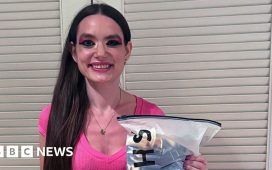Unlock the Editor’s Digest for free
Roula Khalaf, Editor of the FT, selects her favourite stories in this weekly newsletter.
Paddy Crewe’s second novel is set in his native north-east England in the 1980s, a particularly grim period for the region when unemployment was high due to the closures of steel works and coal mines. It is a gear-change from his much-praised and expansive debut novel My Name is Yip (2022) which was set in the 1830s Georgia gold rush.
Many of the scenes in True Love instead conjure up the kind of parochial English melancholy that the singer Morrissey specialises in. Its open-hearted title is also perhaps a clue to how earnest this novel is.
The main characters are two young people: Keely and Finn, who don’t meet until the third and final section of the book. The first section of the novel, “Seacoaler”, delineates Keely’s childhood living in a caravan on a campsite with her father, a seacoaler — someone who makes their living by collecting and selling coal washed up on the beach. He becomes emotionally absent — and eventually, literally absent — after the death by drowning of Keely’s brother Welty.
While Keely is for the most part sensitively written, I have rarely read a recent novel in which the description of how a young woman feels about her developing body has so obviously been written by a man. For example: “Keely is fifteen now. Her body has changed over the past couple of years: her hips have filled out [ . . . ] and her nipples had become hard and painful to the touch, and then, almost day by day, she’d felt the ghostly weight of them added to her, a presence that she’s found both pleasing and disturbing.”

Occasionally, Crewe’s dense prose yields a lovely description, not least: “There’s a thin seam of custard-coloured sky on the horizon. Above it a layer of lilac and then a vast sheet of softly brooding grey that reaches out toward them.” But too often, he has a tendency toward over-explication and commonplace observations.
The second section, “Spurdog”, introduces Finn, a long-haired, introverted boy who is fascinated by the spurdog — a kind of dogfish shark — that his friend’s father catches. Finn is bullied for this at school and ends up being taunted for his apparent resemblance to the creature. He reflects: “But the world, he’s come to understand, is a cruel and chaotic place. This is the conclusion he’s reached, and he can’t see himself shifting away from it. He’s always been fearful of it, the world, but that day taught him to resent it.”
The novel accelerates in its final section, entitled “Snow”, when a life-changing love affair begins — this is by far the most effective and moving part of the book. Here, Crewe’s prose sings and the naivety of his approach briefly becomes a strength. Even as the story reaches towards its dramatic conclusion, however, he can find space for banal observations.
While this novel feels like a mis-step, Crewe is clearly not a writer who is content to keep writing the same book and, given the brio with which his first novel was written, I await his third with interest.
True Love by Paddy Crewe Doubleday £16.99, 320 pages
Join our online book group on Facebook at FT Books Café and subscribe to our podcast Life & Art wherever you listen









